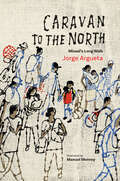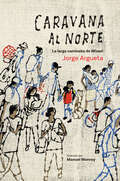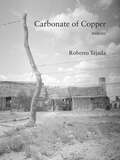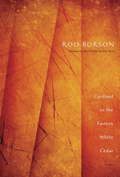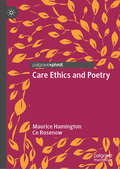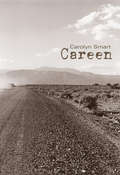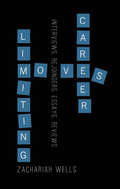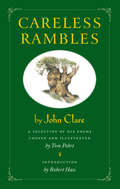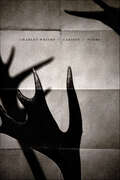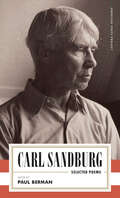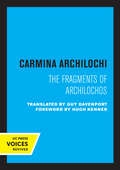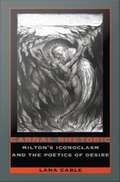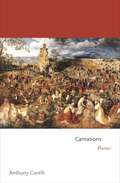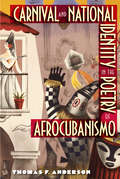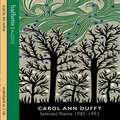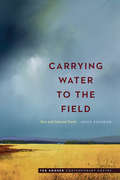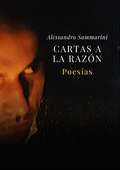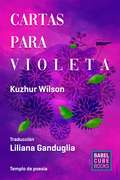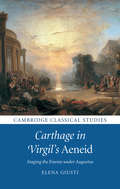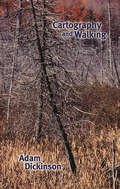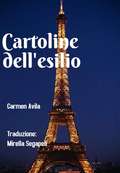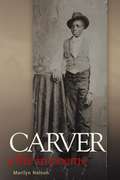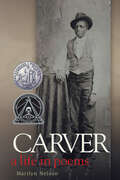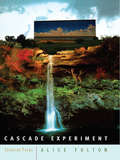- Table View
- List View
Caravan to the North: Misael’s Long Walk
by Jorge ArguetaAn urgent and eloquent account of a boy traveling in a caravan from his beloved homeland of El Salvador to the US border. This novel in verse is a powerful first-person account of Misael Martínez, a Salvadoran boy whose family joins the caravan heading north to the United States. We learn all the different reasons why people feel the need to leave — the hope that lies behind their decision, but also the terrible sadness of leaving home. We learn about how far and hard the trip is, but also about the kindness of those along the way. Finally, once the caravan arrives in Tijuana, Misael and those around him are relieved. They think they have arrived at the goal of the trip — to enter the United States. But then tear gas, hateful demonstrations, force and fear descend on these vulnerable people. The border is closed. The book ends with Misael dreaming of El Salvador. This beautiful and timely story is written in simple but poetic verse by Jorge Argueta, the award-winning author of Somos como las nubes / We Are Like the Clouds. Award-winning Mexican illustrator Manuel Monroy illuminates Misael’s journey. An author’s note is included, along with a map showing the caravan’s route. Key Text Features author’s note map illustrations Correlates to the Common Core State Standards in English Language Arts: CCSS.ELA-LITERACY.RL.4.3 Describe in depth a character, setting, or event in a story or drama, drawing on specific details in the text (e.g., a character's thoughts, words, or actions).
Caravana al Norte: La larga caminata de Misael
by Jorge ArguetaEste hermoso y poético relato de un niño que viaja en una caravana desde El Salvador hacia la frontera de los Estados Unidos, ofrece una necesaria y elocuente visión que contrarresta las mentiras que se escuchan acerca de los inmigrantes centroamericanos cuya única opción es abandonar sus amadas tierras natales.Esta novela en verso es un poderoso relato en primera persona. Cuenta la historia de Misael Martínez, un niño salvadoreño cuya familia se une a la caravana que viaja al Norte, hacia los Estados Unidos. Nos muestra muchas de las razones que hacen que personas sientan la necesidad de irse, la esperanza que se esconde detrás de esta decisión, y la terrible tristeza de abandonar sus hogares. Es un aprendizaje sobre lo largo y arduo del viaje pero también sobre la bondad de aquellos que los ayudan a lo largo del camino. Cuando la caravana finalmente llega a Tijuana, Misael y los que lo acompañan se sienten aliviados. Piensan que han alcanzado la meta del viaje de entrar a los Estados Unidos. Pero enseguida el gas lacrimógeno, las protestas cargadas de odio, la fuerza bruta y el miedo caen sobre esta gente tan vulnerable. La frontera sigue cerrada. El libro termina con Misael soñando con El Salvador.Esta hermosa y relevante historia está escrita en el verso accesible y poético de Jorge Argueta, el galardonado autor de Somos como las nubes / We are Like the Clouds. El premiado ilustrador mexicano Manuel Monroy ilumina la travesía de Misael. El libro incluye una nota final del autor y un mapa que ilustra la ruta de la caravana. Key Text Featuresauthor’s notemapillustrations
Carbonate of Copper
by Roberto TejadaBringing together lyric poetry, documentary photographs, and lives lived along the U.S.-Mexico borderlandWritten during extended periods in Brownsville, McAllen, and Marfa, Texas, in Carbonate of Copper Roberto Tejada gives voice to unsettled stories from the past, as well as to present-day experiences of custody and displacement. The poems stage scenes adjacent to the U.S.-Mexico border and to the realities of migration warped by jarring political vitriol, bearing witness to past and present-day hazards and sorrows wagered by those in search of asylum. So enabled, these poems make visible not only the infrastructure of militarized surveillance and its detention complex but also the aspiration to justice and mercy and the resilient self-organized order of time for migrants seeking human dignity while awaiting passage to the other side of the dividing line.The book’s title refers also to a mineral found in azurite and malachite, a color medium that had an impact on art during the first phase of globalization, the ensuing colonial enterprise, and its systems of extraction. Carbonate of copper was less desirable than the deeper ultramarine made from ground lapis lazuli, but Renaissance artists and patrons nonetheless coveted it and prompted a market for the blue derivative used in tempera and oil pigment. The blue powder pigment serves, too, as a form of sorcery: one that would ward off those who deal in injury of the already dispossessed.Turning his attention to the forced relocation of peoples, the COVID-19 death toll, the encroaching dangers of illiberal rule, the meanings of home and eviction, the power of cultural memory, as well as his artistic forebears, Tejada accounts for the uncounted and those excluded from belonging in voices that tell the cruel fortunes and joyful vitality of human and non-human life forms.
Cardinal in the Eastern White Cedar
by Roo BorsonA captivating and poignant new collection of poetry from Griffin Poetry Prize winner Roo Borson that probes some of our most important questions.After Roo Borson's two previous collections -- Short Journey Upriver Toward Oishida and Rain; road; an open boat -- set the seasons in motion, focusing the poet's mind on time, mortality, transience, and absence, Cardinal in the Eastern White Cedar arrives to complete the triptych. From the glittering, classically rendered image to a freighted, lucid, narrative line, Borson's voice can shift and refract while holding true to the momentary facts of the shifting, given world. Her meditations are a kind of fidelity to inquiry, to attachment, to what can't be fully known. Here the distant past collides with the near future, the present opens suddenly into another age, and friendship becomes the measure of time's salience. These poems depict what vanishes, the various modest homes where half-remembered lives all flow toward their common end. Roo Borson has crowned a sustained achievement with a work of startling intimacy and vividness.
Care Ethics and Poetry
by Maurice Hamington Ce RosenowCare Ethics and Poetry is the first book to address the relationship between poetry and feminist care ethics. The authors argue that morality, and more specifically, moral progress, is a product of inquiry, imagination, and confronting new experiences. Engaging poetry, therefore, can contribute to the habits necessary for a robust moral life—specifically, caring. Each chapter offers poems that can provoke considerations of moral relations without explicitly moralizing. The book contributes to valorizing poetry and aesthetic experience as much as it does to reassessing how we think about care ethics.
Careen
by Carolyn SmartBonnie Parker and Clyde Barrow are the stuff of legend -- why tell their story again? Chances are you don’t know the nuances -- their love story and that of their accomplices Buck Barrow and his wife Blanche; their aspirations, conflicts and prayerful natures; and ultimately the sources of their tragedy. At its core, Careen is a long poem spoken by the characters, though the voices are companioned by newspaper articles often ironically at odds with the inside story. Smart lets the principal actors relate their own tale -- a book of voices speaking out of the desperate Dirty Thirties.
Career-Limiting Moves
by Zachariah WellsBy turns celebratory and sceptical, Career Limiting Moves is a selection of essays and reviews drawn from a decade of immersion in Canadian poetry. Inhabiting a milieu in which unfriendly remarks are typically spoken sotto voce-if at all-Wells has consistently said what he thinks aloud. The pieces in this collection comprise revisionist assessments of some big names in Canadian Poetry (Margaret Atwood, Lorna Crozier, Don McKay and Patrick Lane, among others); satirical ripostes parrying others' critical views (Andre Alexis, Erin Moure, Jan Zwicky); substantial appraisals of underrated or near-forgotten poets (Charles Bruce, Kenneth Leslie, Peter Sanger, John Smith, Peter Trower, Peter Van Toorn); assessments of promising debuts (Suzanne Buffam, Pino Coluccio, Thomas Heise, Peter Norman) and much else besides-including a few surprises for anyone who thinks they have Wells's taste figured out.Zachariah Wells is the editor of Jailbreaks: 99 Canadian Sonnets and the author of two collections of poetry.
Careless Rambles by John Clare: A Selection of His Poems Chosen and Illustrated by Tom Pohrt
by Robert Hass Tom PohrtBorn in 1793, John Clare lived and worked during the Golden Age of British poetry, the time of Shelley, Byron, Keats, and Coleridge. In the grand tradition of English nature writing, he stands alongside Wordsworth as a poet of extraordinary humanity and great spirit. Clare was 18 years old when the first Luddite riots occurred. He was deeply resistant to the first years of England's Enclosure, and he offers a contemporaneous look at what the world was like for those struggling with the impact of the first Industrial Revolution. Uneducated but remarkably well read, Clare was briefly celebrated in London, only to spend his final years in a lunatic asylum. He died in one on May 20, 1864, almost exactly one year before William Butler Yeats was born and the world set out on the path to Modernism.As James Reeves, an early critic and admirer, has said, "The existence of Clare the poet is, of course, a miracle . . . This is its most precious gift. Clare was a happy poet; there is more happiness in his poetry than in that of most others. This was no mere animal contentment of body and senses, but a quiet ecstasy and inward rapture. Such happiness is not to be had except at a price."Tom Pohrt's drawings and watercolors have been widely admired. There are few alive whose sensibility more properly matches Clare's-it's as if Samuel Palmer had taken the commission to illustrate a selection of the peasant poet. Pohrt has himself made the selection of poems from the vast quantity that survived Clare's chaotic life. Robert Hass joins the project to place Clare's work in the larger context of nature poetry in the West. The result is a book sure to please those who know already of Clare's fine poems and those for whom this book will be their exciting introduction.
Caribou: Poems
by Charles WrightA powerfully moving meditation on life and the beyond, from one of our finest American poetsCharles Wright's truth—the truth of nature, of man's yearning for the divine, of aging—is at the heart of the renowned poet's latest collection, Caribou. This is an elegy to transient beauty, a song for the "stepchild hour, / belonging to neither the light nor dark, / The hour of disappearing things," and an expression of Wright's restless questing for a reality beyond the one before our eyes ("We are all going into a world of dark . . . It's okay. That's where the secrets are, / The big ones, the ones too tall to tell"). Caribou's strength is in its quiet, wry profundity. "It's good to be here," Wright tells us. "It's good to be where the world's quiescent, and reminiscent." And to be here—in the pages of this stirring collection—is more than good; Caribou is another remarkable gift from the poet around whose influence "the whole world seems to orbit in a kind of meditative, slow circle" (Poetry).
Carl Sandburg: Selected Poems
by Carl SandburgA fresh look at the Pulitzer Prize–winning poet laureate of the American MidwestWith the publication of Chicago Poems in 1916, Carl Sandburg became one of the most famous poets in America: the voice of a Midwestern literary revolt, fusing free-verse poetics with hard-edged journalistic observation and energetic, sometimes raucous protest. By the time his first book appeared, Sandburg had been many things—a farm hand, a soldier in the Spanish-American War, an active Socialist, a newspaper reporter and movie reviewer—and he was determined to write poetry that would explode the genteel conventions of contemporary verse. His poems are populated by factory workers, washerwomen, crooked politicians, hobos, vaudeville dancers, and battle-scarred radicals. Writing from the bottom up, bringing to his poetry the immediacy of America&’s streets and prairies, factories and jails, Sandburg forged a distinctive style at once lyrical and vernacular, by turns angry, gritty, funny, and tender.
Carmina Archilochi: The Fragments of Archilochos
by Carmina ArchilochiThis title is part of UC Press's Voices Revived program, which commemorates University of California Press’s mission to seek out and cultivate the brightest minds and give them voice, reach, and impact. Drawing on a backlist dating to 1893, Voices Revived makes high-quality, peer-reviewed scholarship accessible once again using print-on-demand technology. This title was originally published in 1964.
Carnal Rhetoric: Milton's Iconoclasm and the Poetics of Desire
by Lana CableIn recent years, New Historicists have situated the iconoclasm of Milton's poetry and prose within the context of political, cultural, and philosophical discourses that foreshadow early modernism. In Carnal Rhetoric, Lana Cable carries these investigations further by exploring the iconoclastic impulse in Milton's works through detailed analyses of his use of metaphor. Building on a provocative iconoclastic theory of metaphor, she breaks new ground in the area of affective stylistics, not only as it pertains to the writings of Milton but also to all expressive language. Cable traces the development of Milton's iconoclastic poetics from its roots in the antiprelatical tracts, through the divorce tracts and Areopagitica, to its fullest dramatic representation in Eikonoklastes and Samson Agonistes. Arguing that, like every creative act, metaphor is by nature a radical and self-transgressing agent of change, she explores the site where metaphoric language and imaginative desire merge. Examining the demands Milton places on metaphor, particularly his emphasis on language as a vehicle for mortal redemption, Cable demonstrates the ways in which metaphor acts for him as that creative and radical agent of change. In the process, she reveals Milton's engagement, at the deepest levels of linguistic creativity, with the early modern commitment to an imaginative and historic remaking of the world. An insightful and synthetic book, Carnal Rhetoric will appeal to scholars of English literature, Milton, and the Renaissance, as well as to those with an interest in the theory of affective stylistics as it pertains to reader-response criticism, semantics, epistemology, and the philosophy and psychology of language.
Carnations: Poems (Princeton Series of Contemporary Poets #59)
by Anthony CarelliIn Anthony Carelli's remarkable debut, Carnations, the poems attempt to reanimate dead metaphors as blossoms: wild and lovely but also fleeting, mortal, and averse to the touch. Here, the poems are carnations, not only flowers, but also body-making words. Nodding to influences as varied as George Herbert, Francis Ponge, Fernando Pessoa, and D. H. Lawrence, Carelli asserts that the poet’s materials—words, objects, phenomena—are sacred, wilting in the moment, yet perennially renewed. Often taking titles from a biblical vocabulary, Carnations reminds us that unremarkable places and events—a game of Frisbee in a winter park, workers stacking panes in a glass factory, or the daily opening of a café—can, in a blink, be new. A short walk home is briefly transformed into a cathedral, and the work-worn body becomes a dancer, a prophet, a muse.______From Carnations:THE PROPHETSAnthony CarelliA river. And if not the river nearby, then a dreamof a river. Nothing happens that doesn’t happenalong a river, however humble the water may be.Take Rowan Creek, the trickle struggling to lugits mirroring across Poynette, wherein, suspended,so gentle and shallow, I learned to walk, bobbingat my father’s knees. Later, whenever we triedto meander on our inner tubes, we’d get lodgedon the bottom. Seth, remember, no matter how we’dkick and shove off, we’d just get lodged again?At most an afternoon would carry us a hundred feettoward the willows. We’d piss ourselves on purposejust to feel the spirits of our warmth haloing out.And once, two bald men on the footbridge, bowingin the sky, stared down at us without a word.
Carnival and National Identity in the Poetry of Afrocubanismo
by Thomas F. Anderson“Traces the ways that Cuban poets dealt with issues of national identity, reflected in their views of Afrocubanismo, often in response to historical changes in public and official opinions on the most visual manifestation of Afro-Cuban culture: carnival.”—Choice “Uncovers a wealth of literary texts, primarily poems, that chart the impact of las comparsas, Afro-Cuban festival dances, on mainstream Cuban life. . . . Investigates the ways in which the relationship between racial and ethnic divisions, and between castes and classes, created a literary movement full to the brim with emotional and sensational resonances.”—Wasafiri “Underscores the sociopolitical and historical contexts of these poems which have shaped the literary production and message of the Afrocubanismo movement. . . . A tour de force.”—Callaloo “Successfully plumbs the position of the Afro-Cuban performer and brings into sharp relief the way politicians historically sought to affect all elements of Cuban culture.”—New West Indian Guide Carnival and National Identity in the Poetry of Afrocubanismo offers thought-provoking new readings of poems by seminal Cuban poets, demonstrating how their writings affected the development of a recognizable Afro-Cuban identity. Thomas Anderson examines the long-running debate between the proponents of Afro-Cuban cultural manifestations and the predominantly white Cuban intelligentsia, who viewed these traditions as “backward” and counter to the interests of the young Republic. Including analyses of the work of Felipe Pichardo Moya, Alejo Carpentier, Nicolás Guillén, Emilio Ballagas, José Zacarías Tallet, Felix B. Caignet, Marcelino Arozarena, and Alfonso Camín, this rigorous, interdisciplinary volume offers a fresh look at the canon of Afrocubanismo and offers surprising insights into Cuban culture during the early years of the Republic.
Carol Ann Duffy: Selected Poems
by Carol Ann DuffySELECTED POEMS is a collection of poetry chosen by Carol Ann Duffy from her first four acclaimed novels: STANDING FEMALE NUDE, SELLING MANHATTAN, THE OTHER COUNTRY and MEAN TIME (winner of the Whitbread Poetry Award). It is read by the author - the first time she's recorded her work as an audiobook.
Carrying Water to the Field: New and Selected Poems (Ted Kooser Contemporary Poetry)
by Joyce SutphenJoyce Sutphen’s evocations of life on a small farm, coming of age in the late 1960s, and traveling and searching for balance in a very modern world are both deeply personal and familiar. Readers from Maine to Minnesota and beyond will recognize themselves, their parents, aunts and uncles, and neighbors in these poems, which move us from delight in keen description toward something like wisdom or solace in the things of this world. In addition to poems selected from the last twenty-five years, Carrying Water to the Field includes more than forty new poems on the themes of luck, hard work, and the ravages of time—erasures that Sutphen attempts to ameliorate with her careful attention to language and lyrical precision.
Cars What Am I? (First Concepts)
by Disney PixarJoin your favorite friends from CARS as they play a mystery game! Told in rhyme, kids can guess along, "What Am I?" Picture descriptions present.
Cartas a la razón
by Marlo LópezEste camino mío es un viaje a lo largo de veinte años, en el que hay un amor no correspondido que lleva inevitablemente a una crisis de identidad, desarrollándose luego en una nueva relación que llega a la coronación del sueño de amor. Se concluye con un intenso análisis del período vivido, una especie de reelaboración del pasado. De lo alto de tantos estados emocionales se describe la visión en el tiempo, para impulsarse con la mente a buscar y a encontrar personales verdades. La búsqueda de mí mismo comenzó con la intención de amar, con el deseo de enamorarme. El amor es vivido con una reflexión racional y una participación infantil que descubre uno de los planes más bajos del miedo: el miedo de amar. Al revelarse los miedos se descubren las ansias, defensas personales que hacen huir de un peligro irracional, hasta revelar la verdad, en este caso yo mismo.
Cartas para Violeta
by Kuzhur WilsonLos poemas de esta colección, Cartas para Violeta, son un intento de traducir el amor en la naturaleza, el tiempo, y las demás coordenadas de la mente (En la vida anterior y la última/recuerdo contarte que habías encontrado mi poema vagando por algún lugar preguntando el nombre de la primavera). Este trabajo no es una versión poética mejorada de la poesía beta de Kuzhur que ya está instalada en tus sistemas; esta es una colección nicho que se puede segregar dentro de múltiples hebras de información poética. Sin embargo, si este es tu primera vez en esta instalación poética, definitivamente tendrás que probar algunas pocas aplicaciones más de su tienda. La poesía en la Era de la Gran Información Aditya Shankar
Carthage in Virgil’s Aeneid: Staging the Enemy Under Augustus (Cambridge Classical Studies)
by Elena GiustiFounded upon more than a century of civil bloodshed, the first imperial regime of ancient Rome, the Principate of Caesar Augustus, looked at Rome's distant and glorious past in order to justify and promote its existence under the disguise of a restoration of the old Republic. In doing so, it used and revisited the history and myth of Rome's major success against external enemies: the wars against Carthage. This book explores the ideological use of Carthage in the most authoritative of the Augustan literary texts, the Aeneid of Virgil. It analyses the ideological portrait of Carthaginians from the middle Republic and the truth-twisting involved in writing about the Punic Wars under the Principate. It also investigates the mirroring between Carthage and Rome in a poem whose primary concern was rather the traumatic memory of Civil War and the subsequent subversion of Rome's Republican institutions through the establishment of Augustus' Principate.<P><P> Provides a new literary and historicist reading of Virgil's Aeneid and its Augustan context.<P> Investigates afresh the ideology of Caesar Augustus in relation to the wider history of ideologies and autocratic regimes.<P> Engages in a range of approaches of great current interest, such as the representation of the other and the erasure of subalterns from classical texts.
Cartography and Walking
by Adam DickinsonShortlisted for the 2003 Henry Kreisel Award for Best First Book (Writers Guild of Alberta Award) In Cartography and Walking, Adam Dickinson charts his own listening -- an acute listening of eye and ear, a listening with both body and mind. "Cartography" is more than a metaphor for him, it's a way of being. It is how we dwell in the world, and how intimacy enriches such dwelling. Yet "cartography" is the presiding metaphor, the structure of this book; in giving it such a place, Dickinson reminds the reader of that very human impulse to plot, to imagine. Each poem is itself a kind of mapping, through language and sound, through minute observation, until land, love, and everyday life are given new embodiment, are newly discovered, and a reader finds new countries in strangely familiar settings.
Cartoline dell'esilio
by Carmen AvilaImmagini poetiche che descrivono la sua permanenza in città straniere, un’opera permeata di emozioni come il rimpianto e il desiderio di trovarsi in due posti al tempo stesso. Nostalgia di un esilio volontario, in cui mette in discussione le città, ponendole dinanzi al loro lato oscuro, alla bellezza e alla meraviglia, a partire dalla solitudine che provoca l'essere straniera in un’altra terra.
Carver: A Life In Poems
by Marilyn NelsonGeorge Washington Carver was born a slave in Missouri about 1864 and was raised by the childless white couple who had owned his mother. In 1877 he left home in search of an education, eventually earning a master's degree. In 1896, Booker T. Washington invited Carver to start the agricultural department at the all-black-staffed Tuskegee Institute, where he spent the rest of his life seeking solutions to the poverty among landless black farmers by developing new uses for soil-replenishing crops such as peanuts, cowpeas, and sweet potatoes. Carver's achievements as a botanist and inventor were balanced by his gifts as a painter, musician, and teacher. This Newbery Honor Book and Coretta Scott King Author Honor Book by Marilyn Nelson provides a compelling and revealing portrait of Carver's complex, richly interior, profoundly devout life.<P><P> Newbery Medal Honor book
Carver: A Life in Poems
by Marilyn NelsonGeorge Washington Carver was born a slave in Missouri about 1864 and was raised by the childless white couple who had owned his mother. In 1877 he left home in search of an education, eventually earning a master's degree. In 1896, Booker T. Washington invited Carver to start the agricultural department at the all-black-staffed Tuskegee Institute, where he spent the rest of his life seeking solutions to the poverty among landless black farmers by developing new uses for soil-replenishing crops such as peanuts, cowpeas, and sweet potatoes. Carver's achievements as a botanist and inventor were balanced by his gifts as a painter, musician, and teacher. This Newbery Honor Book and Coretta Scott King Author Honor Book by Marilyn Nelson provides a compelling and revealing portrait of Carver's complex, richly interior, profoundly devout life.
Cascade Experiment: Selected Poems
by Alice FultonHighlights from each of Alice Fulton's groundbreaking, prize-winning poetry books. Over the past twenty years, Alice Fulton has emerged as one of the most brilliant and honored poets of her generation. She is also among the most thrillingly inventive, compassionate, and necessary. Cascade Experiment charts the evolution of a poetics that revises the limits of language, emotion, and thought.
